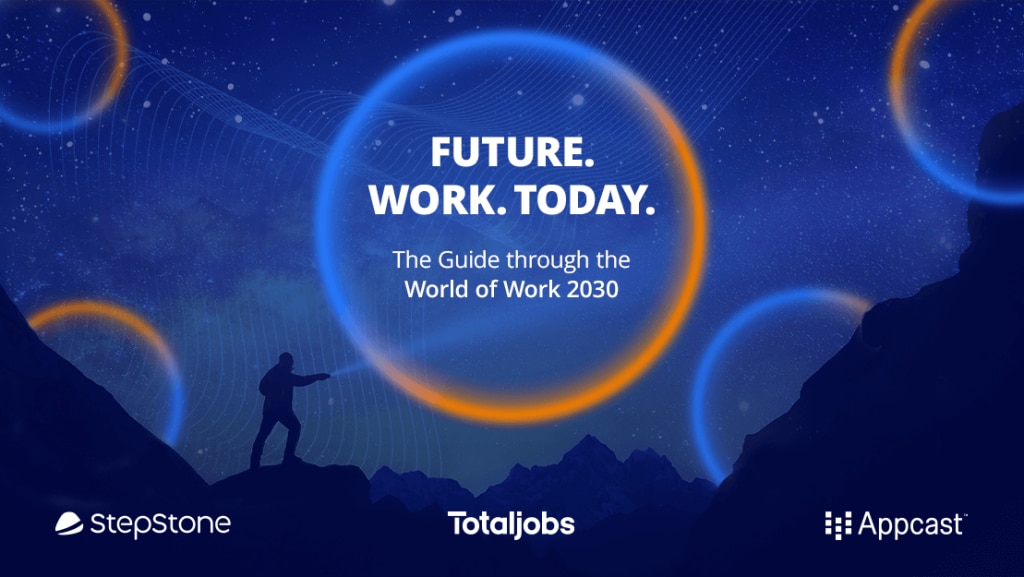Future.Work.Today: equality, autonomy & technology in the workplace of tomorrow
What will work look like in the future? New research from Totaljobs, StepStone and Appcast sheds light on emerging workforce trends across the globe – from the rise of candidate ‘bargaining power’ to ongoing labour shortages – and investigates their potential to shape the workplace of tomorrow.

The ‘Great Resignation’ is the name given to the trend of people choosing to quit or change their jobs, or considering doing so soon, largely attributed to work and life changes caused by the Covid-19 pandemic. This phenomenon has forced many companies to re-evaluate how they operate and acquire talent, as many employees have decided to leave their jobs. Job unsatisfaction is at an all-time high. For those who are still employed and not satisfied with their work conditions, the uncertainty about the future can be stressful and overwhelming.
While it may seem like a daunting task, a career change under current and future market conditions can be an empowering experience. With careful planning, jobseekers can find a new job that is a better fit for their skills and interests. And with the added flexibility of working from home in some jobs, employees may even find that they can have a better work-life balance.
Bargaining power
What will work look like in the future? It’s a question that has long been debated by experts and thought leaders. While no one can say for certain, there are some emerging trends that suggest certain changes. One of the most significant is the increasing bargaining power of employees.
The global labour shortage, and the fact that there are not enough workers, will lead to deep structural changes in the workplace. The recent survey from Totaljobs, StepStone and Appcast in the UK: Future.Work.Today explored how people assess their bargaining power in a scale between -10 and +10, with -10 being all the bargaining power with the employer, and +10 being all the bargaining power on the side of the employee. It found that the situation is currently rather favourable for workers. Employees in the UK assess their negotiating position with respect to their employers at +2 and expect it to improve by 2030 by +3 points.
Respondents under 20 years old are very optimistic and expect an increase in bargaining power from +2 to +4 by 2030. Professions related to art, design, creative work, and architecture will see an increase from +0.5 to +3, followed by marketing and advertising, from -2 to +1. Regarding employees in specific industries such as healthcare and the public sector they will have an increase of bargaining power from +1 to +3. Bargaining power in the Pharma industry will grow from -3 to +2 by 2030.
Employees in Agriculture, Farming, Fishing, Gardening (+5), Banking (+3) Chemical industry (+4), real estate, and technology expect to see almost no changes, although their bargaining power is high in relation to the median employee.
A growing shortage of workers
The future of work is looking increasingly uncertain, as the baby boomer generation begins to retire. This is creating a labour shortage that is acute in the UK, where businesses are struggling to retain existing staff members and recruit new talent. One way to offset this problem is by promoting immigration, ensuring that businesses have access to the workers and talent pools they need. By recruiting and retaining foreign workers, businesses can ensure that they have the staff they need to remain competitive in an ever-changing labour market. Immigration will become increasingly important in the coming years, as we depend more on IT and technological services. In the era of information, we need constant maintenance and expansion of our digital infrastructures. Most respondents who belong to the listed sectors below agree that immigration will be important for the UK´s economic success.

Some UK workers are not convinced that their wages will rise significantly in the future. This is despite most respondents believing this to be true, with workers over 60 being among those least likely of all groups to agree on a future average increase in salaries. Given the shifts in bargaining power towards employees, job changes could potentially improve this situation regarding salaries.

Most respondents in all age groups agree that job applications will be quicker in the future. Foremost among young people there is the belief that one single click or swipe on a smartphone will be enough for a job application. As this trend quickly materialises, job platforms reduce frictions and save valuable time in the job application process.

Key takeaways
In United Kingdom most respondents agree that the bargaining power of employees will be stronger (67%), immigration into the UK is important for its continued success (79%). Gender equality in pay and working conditions will improve as well (78%). The same for people who work in occupations that cannot easily be automated (73%). Increasingly, people will not be tied to a permanent job. Instead, they will accept work from more untraditional employers (77%).
Conclusion
The bargaining power of employees will be stronger, although not equally strong in all jobs; immigration will be important to the UK, gender equality will improve foremost regarding salaries. People working in occupations that cannot be easily automated will have better conditions, more and more people will not be tied to a permanent job. Companies will have to create attractive and flexible offers for older employees to improve their expectations and wellbeing, such that they decide to stay in the workforce.
British companies are global, and technology continues to advance, the pool of qualified workers is becoming increasingly competitive. As a result, employees are in a stronger position to demand higher salaries and better working conditions. Regarding gender equality women are earning higher salaries and their salary conditions are expected to improve. Finally, another group that is likely to benefit from future changes is those of workers in occupations that cannot be automated. With the continued rise of automation, jobs that require human interaction, soft skills and expertise working in teams are becoming increasingly valuable.
A global comparison
Our Future.Work.Today research involved a survey of over 17,500 people from across the UK, the US and Germany, representing three of the top five industrial nations in the world. Read the full guide for more on the trends identified in this article, and a comparison between labour markets.
